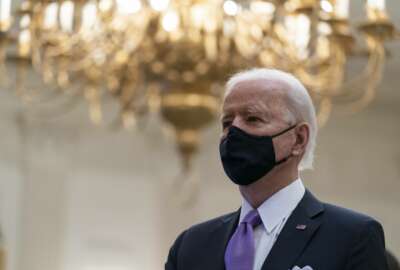FLRA nominees pledge expeditious action on backlog of unfair labor practice complaints
The Federal Labor Relations Authority faces a backlog of unfair labor practice complaints, which have built over the last four years without a Senate-confirmed...
The Federal Labor Relations Authority and the Merit Systems Protection Board are two relatively small agencies with different missions.
But they share a similar challenge. Vacancies inside both agencies over the last four years prevented them from moving on key decisions, which created backlogs at the two organizations.
The MSPB has a backlog with thousands of cases. The pending caseload at the FLRA is smaller, but still large enough to grab congressional attention.
The FLRA administers the federal-labor relations program in the executive branch. It establishes guidance and policies on the program and hears out disputes from agencies and unions.
To date, there are roughly 275 pending unfair labor practice complaints at the authority, said Sen. Kyrsten Sinema (D-Ariz.), chairman of the Homeland Security and Governmental Affairs Subcommittee on Government Operations and Border Management.
The authority hasn’t had a general counsel since January 2017, and no one has served in an acting capacity for much of the last four years, either.
Tensions between labor and management were high during the last four years, and federal employee unions issued their fair share of unfair labor practice complaints during that time.
But without a FLRA general counsel, the authority’s findings on those disputes between agencies and unions have been meaningless. Only the general counsel has the authority to enforce findings from arbitrators.
President Joe Biden in August nominated Kurt Rumsfeld, a chief counsel at the authority, to be the permanent general counsel.
Addressing the current backlog of pending unfair labor practice charges would be his top priority, Rumsfeld told the Senate Homeland Security and Governmental Affairs Committee Wednesday.
“I plan on meeting with OGE’s leadership to review the procedures that have been utilized thus far to address the backlog and also the status of the backlog itself,” he said. “They have made some in-roads in addressing the backlog, and I think we can learn from the experience.”
Rumsfeld said he would meet with FLRA staff and discuss tactics the authority used in the past to address previous backlogs.
Ernest DuBester, the president’s nominee to serve as FLRA chairman, said the authority has made some progress on the backlog in the last year.
The authority’s general counsel closed about 120 cases since the Biden administration installed Charlotte Dye, the FLRA deputy general, as its acting general counsel in March, he said.
DuBester is a familiar face within the FLRA. He’s been a member of the authority since 2009, and the Senate has unanimously confirmed him to various positions on three separate occasions.
When he joined the authority in 2009, the backlog was more daunting then than it is now, DuBester said.
“We put into effect what I call a critical action plan,” he said. “It [had] time targets. And it tried to harmonize targeting cases that were really old, what I would fairly characterize as in a backlog, but also not ignoring new filings. That’s always the issue.”
“As part of our public service obligation to the labor management community we have a statutory responsible to try to move cases as quickly as possible,” DuBester added.
Resolving the backlog will be a challenge in its own right, but more so considering the FLRA’s general counsel office has lost nearly half of its own attorneys in recent years, Sinema said.
Employee engagement scores and the FLRA’s standings on the annual Best Places to Work rankings have fallen in the last few years as well.
“Employees, our staff, need to know that they work they do is important and valued. Leadership, in other words, believes in the mission of the agency,” DuBester said.
Biden also nominated Susan Tsui Grundmann, a former MSPB chairman, as his second Democrat to serve at the authority.
Grundmann currently leads the Office of Congressional Workplace Rights and once served as the general counsel for both the National Federation of Federal Employees and the National Air Traffic Controllers Association. At NFFE, she helped fight against proposed changes to the Defense Department’s personnel system.
And at the Office of Congressional Workplace Rights, she oversaw a major reorganization.
“When given a timeframe of six months to implement an overhaul of an agency, you can do it and you can do it with the proper resources and the proper personnel,” she said. “What I’ve learned is to build teams, build coalitions and set timelines and timeframes and hold yourself to them. We can do that wherever we go.”
Copyright © 2025 Federal News Network. All rights reserved. This website is not intended for users located within the European Economic Area.
Nicole Ogrysko is a reporter for Federal News Network focusing on the federal workforce and federal pay and benefits.
Follow @nogryskoWFED






